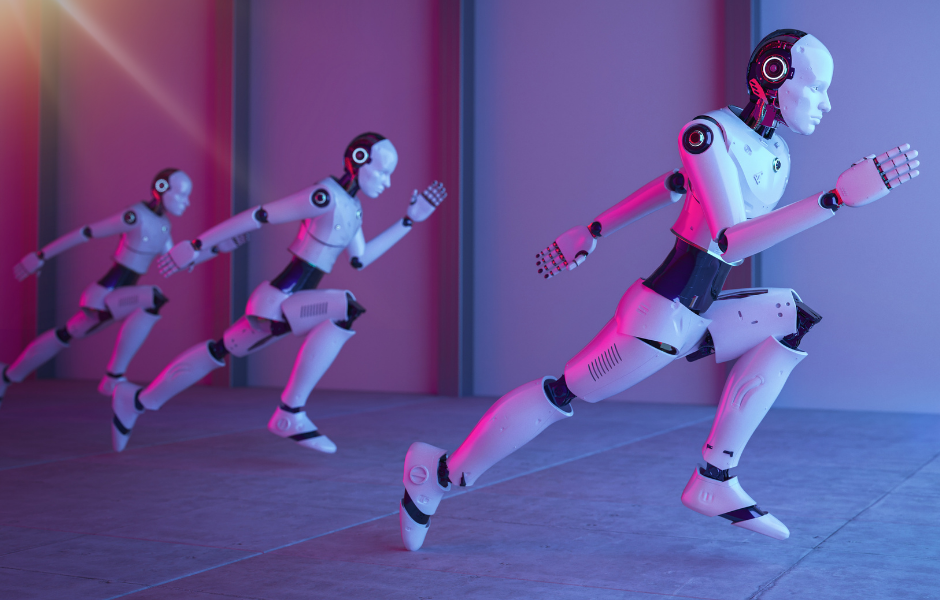
This children’s article, The World Humanoid Robot Games! When sport meets science fiction, has been written for native English speakers and learners of English as a second or foreign language. It can help children build vocabulary, learn about robotics and artificial intelligence, and discover how technology is shaping the future. Written by Mark Pulley, a teacher and writer who creates fun and informative news articles for English learners.
A sporting event like no other
From a distance, it might have looked like humans running the 400 metres, but look closer and you’d see that it was robots! In Beijing, China, the World Humanoid Robot Games brought together 280 teams from 16 countries to see what robots could do.
Starting on Friday the 15th of August and lasting for three days, robots competed in track and field events, football matches, and even table tennis. There were also “robot-only” challenges, like sorting medicines, handling materials, and cleaning tasks. Not exactly what we’re used to in the Olympics, but it was interesting nonetheless.
Robots from around the world
Teams came from all over the globe, including the United States, Germany, Brazil, and, of course, China. Some teams were from universities, while others represented private companies working on the latest robot technology.
Unsurprisingly, as they hosted the event, many robots were made by Chinese companies, but there were plenty of international teams to give the games a real worldwide feel.
Funny tumbles and surprising skills
It’s fair to say that things didn’t always go to plan for those in control. Robots sprinted down the track only to topple over mid-race, and football matches often ended with piles of robots tangled on the ground.
Spectators gasped and laughed when a robot suddenly collapsed in the middle of the 1500-metre race. But there were also moments of triumph. Some robots managed to stand up on their own after falling, earning big cheers from the crowd.
Why it matters
While it may appear to be a comedy show at times, the event was about much more than entertainment. Every tumble, race, and football kick helped researchers collect important data. The goal is to improve robots so they can become more useful and reliable in the future.
China is investing heavily in robotics, and these games are just one example of how quickly technology is moving forward. From marathons to robot football, the future of sport, and work, may have some unusual new players.

Article vocabulary list
- Humanoid – A robot designed to look or act like a human.
- Artificial intelligence (AI) – Technology that allows machines to “think” and learn.
- Spectators – People who watch an event.
- Triumph – A great success or victory.
- Tangle – A messy knot or pile, like when robots fall into each other.
- Factory – A place where goods are made, often with machines.
- Coordination – The ability to move smoothly and control actions.
- Data – Information collected that can be studied and used to improve something.
Comprehension questions
Just click the plus (+) to see the answer
1. Where were the World Humanoid Robot Games held?
A) Berlin, Germany
B) Beijing, China
C) Tokyo, Japan
Answer: B) Beijing, China
2. How many teams took part in the games?
A) 280
B) 180
C) 80
Answer: A) 280
3. Which sports did the robots compete in?
A) Swimming and cycling
B) Football and table tennis
C) Boxing and wrestling
Answer: B) Football and table tennis
4. What sometimes happened to the robots during races and matches?
A) They floated into the air
B) They fell over and crashed into each other
C) They refused to play
Answer: B) They fell over and crashed into each other
5. Why are events like these important?
A) They provide useful data to improve robots for real-life jobs
B) They only entertain crowds
C) They train humans to run faster
Answer: A) They provide useful data to improve robots for real-life jobs

Mark is a writer and EFL teacher from England with eight years’ experience. He’s passionate about travel, sport (especially football), animals, nature, and history, and enjoys helping children explore the world through language and learning.




